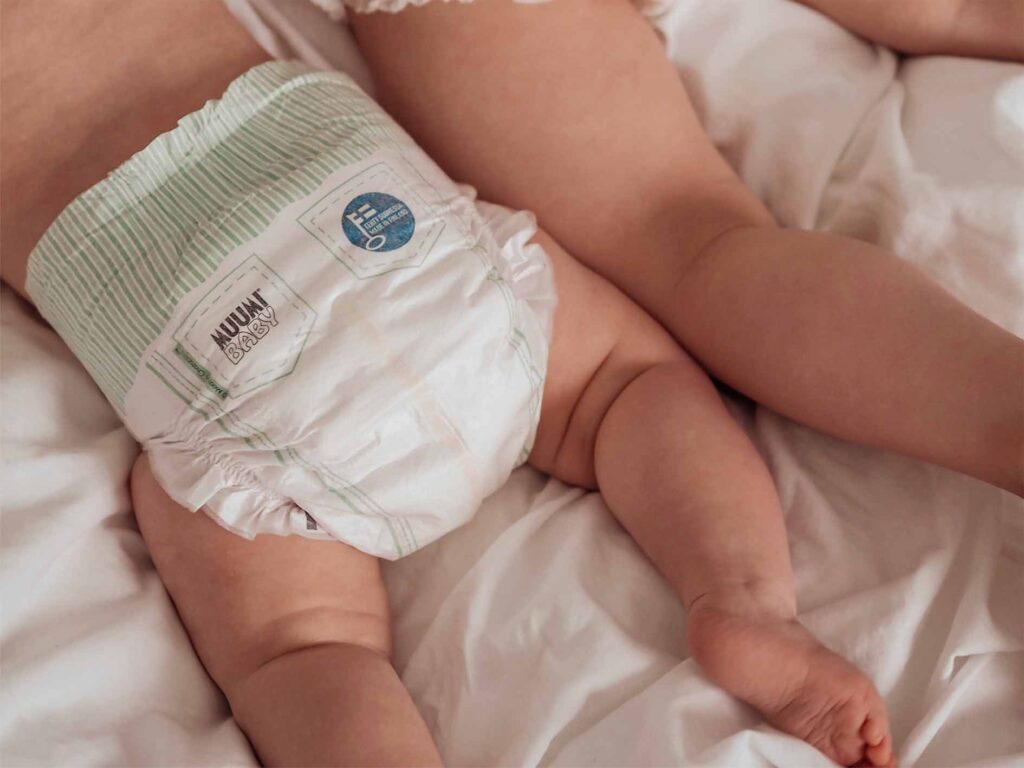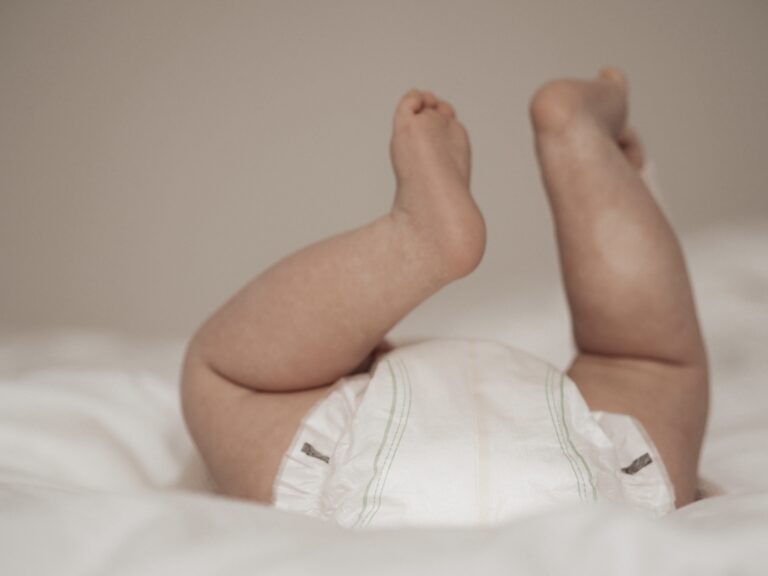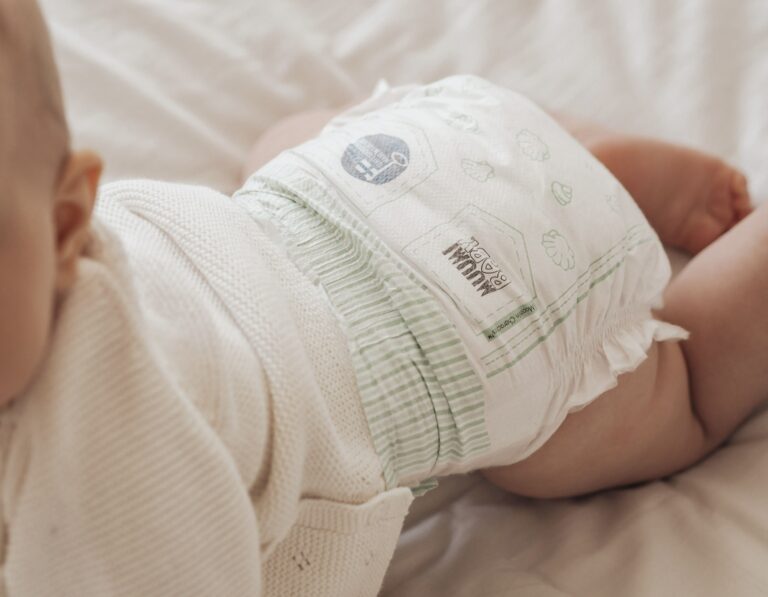A baby’s poo is often a concern for parents, as its colour, texture and smell can vary widely. But did you know that these characteristics can provide important information about your baby’s health? In this article, we’ll go through what different colours and textures of baby poo can mean, so you can be better prepared to understand and respond to your baby’s needs.
Baby poop: A general overview
Baby stool, or ‘poo’ as it is often called, is an important part of a baby’s digestive system. Each layer of baby stool provides parents with important clues about their baby’s health, diet and well-being. The consistency, colour, smell and amount of baby poo can vary greatly depending on many factors, including the age of the baby, diet and any health problems.
In the first few weeks of life, your baby’s stool may be sticky and black, but it will lighten and become lighter in colour as your baby starts to receive milk. Continual changes in the colour and consistency of the stool are normal during the first year of a baby’s life. It is important for parents to know what they should look for in their baby’s stool so that they can identify any health problems early.
Read what you should know about baby’s flatulence here!
The texture of your baby’s poo is as important as its colour.
Baby poo consistency: What can it tell you about your baby’s health?
The texture of your baby’s poo is as important as its colour. A newborn’s first poo, meconium, is sticky and tarry. After a few days, the baby’s stool becomes soft and pasty. This is the normal consistency for babies feeding breast milk or formula and may contain small granules.
Reactions to a new diet, such as the introduction of solid foods, can also affect the texture and smell of the poo. In a healthy baby, poo should be soft and easy to squeeze. Hard, dry or slightly hardened stools may indicate constipation.
Poop that is almost watery or has a watery consistency can be a sign of diarrhea. If these symptoms persist for several days or are accompanied by other concerns, such as fever, you should seek medical advice.
Effect of diet on the colour and texture of your baby’s poo
The baby’s diet is a key factor in determining the colour and texture of the poo. For the first few days after birth, when a baby eats only breast milk or formula, their stools are usually soft, yellow and fine-grained.
The introduction of solids has a significant impact on the colour and composition of stool. For example, bananas, rice or bread can make stools harder, while fruit and vegetables can make stools softer.
If you give your baby beetroot or strawberries, you may notice red spots in the stool. Corn can make the stools more yellow. Wholegrain cereals can cause stools to darken.
It is important to remember that although dietary changes may cause changes to your baby’s poo, they are part of normal development. However, if you notice persistent, significant changes in your baby’s stool, or if they develop other symptoms such as fever or diarrhea, it’s always a good idea to talk to a doctor.
How can different diseases affect the colour and consistency of your baby’s poo?
Several diseases or medical conditions can affect the colour and consistency of your baby’s stool. For example, intestinal infections can cause bright green or foamy stools. Viruses or bacteria can make the stool loose or watery, and anal ulcers or infections can cause blood to appear in the stool. Lactose intolerance or certain food allergies can cause diarrhea, bloating, abdominal pain or green stools in babies.
Liver or gallbladder problems can lead to a change in the colour of the stools to grey or white. Although most changes in the colour or consistency of the poo are harmless, a persistent or sudden change, especially if accompanied by other symptoms, may be a sign of a more serious problem. If you are concerned about changes in the colour, consistency or volume of your baby’s stool, it is best to consult a doctor.
Find out more about why your baby is not pooping and what might be causing it – click here!
If the green colour of your baby’s poo persists for a long time, it may indicate digestive problems or even an infection.
Baby’s green poo
A baby’s green poo can be a cause for concern for parents, but it is often a normal and expected part of a baby’s digestive development. Initially in the postnatal period, meconium is dark green in colour and turns yellow within a few days. Rapid digestion caused by feeding breast milk or milk substitutes can also lead to a greenish tinge.
On the other hand, if the green colour persists for a long time, it may indicate digestive problems or even an infection. For example, there may be too much bile in the baby’s intestines, which turns the stool green, or it could be a food allergy or intolerance.
In any case, if you notice persistent green stools or if they are mixed with foam or mucus, it is advisable to contact your pediatrician. Remember that even small changes in diet can affect the colour of the stool.
Baby’s black poo
The first stool of newborns, called meconium, is deep green or black, sticky and tarry. This is normal and is due to the cleansing of the baby’s digestive tract after birth. After a few days, the poo should turn yellow or yellowish green.
If you notice persistent dark or black tones in your baby’s stools, it may indicate the presence of blood in the stools. Alternatively, dark stools may be caused by iron supplements or dark foods such as blue berries or spinach.
Blood in the stools can be a sign of a more serious problem, such as an ulcer or a ruptured oesophagus or bowel. It is therefore important to consult a doctor if you notice black stools that cannot be explained by your baby’s diet or the use of iron supplements.

Baby’s slimy poo
Sometimes you may notice that your baby’s poo looks slimy. Occasionally, this is not usually a cause for concern as it may be due to the introduction of saliva, nasal mucus or new foods into your baby’s diet.
However, if your baby has persistent mucus in their stools, it could be a sign of inflammation, infection or allergy. Slimy poo can also indicate a gastrointestinal disorder such as irritable bowel syndrome or celiac disease.
Intestinal parasites, such as intestinal worms, can also sometimes cause slimy stools. Finally, slimy poo can occur in babies who have been given antibiotics. If your baby’s stools are consistently slimy, or mixed with blood or pus, it is best to contact your pediatrician.
Baby’s watery milk poo
Watery baby milk poo can be a normal occurrence, especially in breastfeeding babies. These babies may experience what some people refer to as “milk poo”, where their poo is pale, watery and can occur frequently. This is because the baby is getting more milk than their body can digest, causing the stool to become watery. Although this is usually normal, it can sometimes be a sign of dietary problems. For example, some babies have lactose intolerance, which means they cannot digest the sugar in milk, lactose, leading to diarrhea.
On the other hand, persistent or extremely watery stools may indicate infections or intestinal diseases, and may lead to dehydration. If your baby’s stools are consistently watery, or if you are concerned about the frequency or amount of measurements, you should talk to your doctor.
Most often, the hardness of a baby’s stool is due to not getting enough fluid or fibre.
Baby’s hard poo
A baby’s loud poo can cause worry and discomfort for both the baby and the parents. Most often, hardness in a baby’s stool is caused by not getting enough fluid or fibre. This is usually a normal reaction when a baby starts to eat solid food. Hard stools can also occur if the baby gets too much of certain dairy products or grains. If your baby’s stools are consistently hard, it may be due to constipation, which is a common problem in babies.
Very hard or painful stools can sometimes be a sign of a more serious condition, such as a blocked bowel. If you suspect that your baby is suffering from constipation or if you notice that they have bloody or black stools, contact your doctor immediately.
Baby’s soft poo
Soft poo is not necessarily a cause for concern, especially if your baby is exclusively breastfed. The stool produced by breast milk is usually soft and may even be slightly runny. It is often yellow and contains small granular particles.
On the other hand, if your baby has persistent loose stools or a significant increase in poo, this could be a sign of diarrhea. Diarrhea in a young baby can cause dehydration quickly, so it is important to monitor your baby’s hydration closely. Causes of diarrhea may include a virus or bacterial infection, food allergies or intolerances, or adverse effects of medication. If your baby has watery stools, a fever, seems unhappy or has fewer pee cycles, contact your doctor.
Baby’s foamy poo
Foamy stools in a baby can sometimes be normal, but if it happens consistently, it could be a sign of a digestive problem or infection. Foamy stools can be caused by swallowing too much air during crying or breastfeeding, leaving air bubbles in the stool. On the other hand, foamy stools can be caused by a milk or soy allergy, where the baby reacts to proteins in breast milk or formula.
Sometimes it can be a sign of an intestinal infection, such as giardiasis, which causes foamy, smelly stools. If you notice that your baby has repeated foamy stools or other symptoms such as a rash, vomiting, green stools or nausea, contact your doctor.
When should you contact a doctor?
Although the colour and consistency of your baby’s poo can vary greatly, there are some situations that should not be overlooked. You should contact your pediatrician if you notice any of the following: your baby’s stool shows blood, is consistently white or grey, or is extremely dark or even black. You should also contact your doctor if your baby has mucus or putrefaction in their poo, or if hard stools cause your baby to strain.
Similarly, persistent loose or watery stools may indicate a risk of dehydration, especially if accompanied by other symptoms such as fever or loss of appetite. Finally, if you notice any persistent or worrying change in your baby’s poo, contact your doctor for advice and reassurance.
Order a free Diaper Hero diaper sample
Monitoring your baby’s wellbeing is of paramount importance, and one effective way to do this is to observe the characteristics of your baby’s stools, such as their colour, consistency and volume. These factors can provide valuable information about your baby’s health.
That’s why it’s extremely important that your baby’s diapers are always just right for them and comfortable to wear. We would like to offer you the opportunity to try Moomin Baby diapers for free. These diapers are particularly absorbent, allow your baby’s skin to breathe and are gentle on sensitive skin.
Our diapers are approved by the Allergy, Dermatology and Asthma Association and are made of environmentally friendly materials. We also have a range of sizes from newborn to toddler, so you can choose the right size for your baby.
Please note that the free Diaper Hero sample contains two pieces of size 1 Newborn diapers and two pieces of size 2 Newborn diapers.
We welcome you to try Moomin Baby diapers by ordering your free Diaper Hero sample here!










